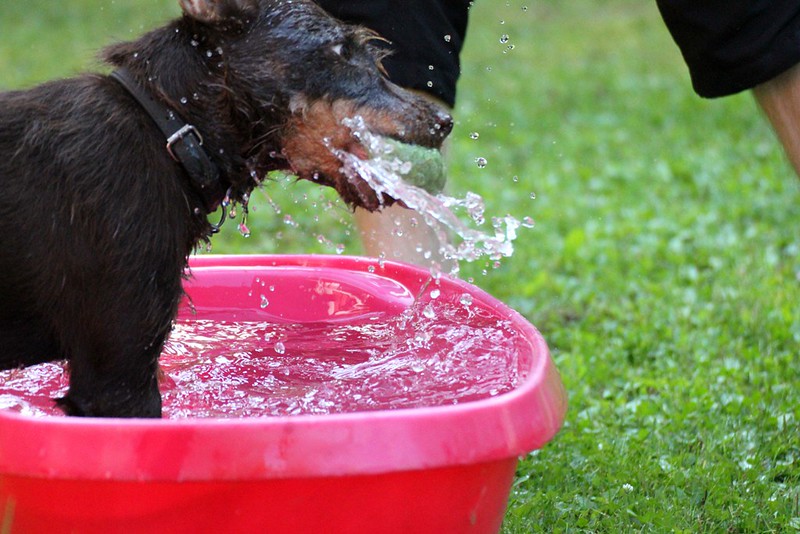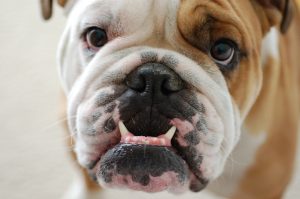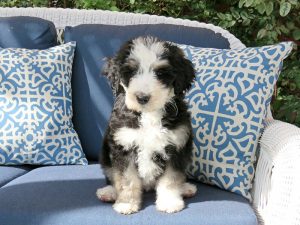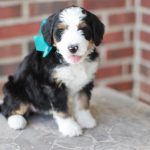The German Hunting Terrier, also known as Jagdterrier, is a small-sized dog originally bred for working purposes in Germany. Also popular as a Deutscher Jagdterrier locally, this dog is also used for hunting quarry.
Fun fact: The Jagdterrier is pronounced as Yack Terrier
The German Hunting Terrier is a breed characterized by a big personality packed into a small frame. Don’t let their size fool you! As dedicated working dogs, they truly thrive when they can stretch their legs and embrace the great outdoors.
Belonging to the Terrier group, these little dynamos are astonishingly talented. Historically, they have been utilized to hunt formidable quarry such as foxes, bobcats, and even cougars, a testament to their incredible spirit and drive.
In essence, these dogs are courageous, exceptionally trainable, and possess a wonderfully focused temperament. If you’re compiling a list of the top dogs for specialized hunting tasks, especially those requiring work underground, the German Hunting Dog consistently earns its spot near the top.
In this article, the German Hunting Dog will be discussed in detail. So, if you are planning to get this intelligent and smart breed, this article is most likely for you.
Table of Contents
German Hunting Terrier Quick Facts:
Name: German Hunting Terrier
Other Names: German Gagdterrier, Deutscher Jagdterrier, German Hunt Terrier, Jagdterrier
Origin: Germany
Weight: 17 to 22 Pounds
Average Height: 33 to 41 cm
Colors: Black, Dark Brown, Black-and-Grey, Black-and-Tan, Yellow.
Coat: Short and smooth, wiry
Temperament: Active and intelligent
Lifespan: 10 to 12 years
Best for: Underground hunting
Puppy Price: A purebred puppy may cost you up to $2000.
History and Origin:
The story of the German Hunting Terrier begins in the period following World War I. German hunters, driven by a strong desire to create a dedicated, small-sized hunting breed native to Germany, took action. Their goal was clear: to develop a superior local dog and move away from relying on foreign hunting breeds.
The foundation of the first German Hunting Terriers involved mixing several key lines:
- Hunting Terriers (related to the Fox Terrier lines) that possessed the desired black-and-tan coloring.
- The Old English Wirehaired Terrier.
- The Welsh Terrier.
This careful combination of intelligent and tenacious breeds resulted in the German Hunting Terrier we know today; an all-rounder and multi-talented dog that is remarkably easy to train and has an often-surprising affinity for water.
The breed’s successful development and maturation led to an important milestone in 1926, with the founding of the German Hunting Terrier Club. Interestingly, the breed’s rapid rise in popularity in Germany during this time was also boosted by the growing sense of nationalism sweeping the country after the war, cementing the breed’s place as a proud German creation.
Temperament and behavior:
As mentioned above, the German Hunting Terrier (Jagdterrier) is a versatile breed, originally engineered for rigorous hunting work. This heritage profoundly shapes their personality.
Thanks to their high intelligence, the German Hunting Terrier can be a wonderful family pet, but this transition requires significant commitment. They require extensive training and early, thorough socialization to thrive in a domestic setting.
- Exercise is Mandatory: Given their boundless energy, these dogs love the outdoors and have exceptionally high exercise needs. Simply put, they are not suited for a sedentary life.
- Courageous and Determined: The American Kennel Club (AKC) aptly describes them as courageous and enduring. If you’re considering one as a pet, you must maintain a firm and consistent hand in their training and daily routine.
- Kids and Companionship: While they can enjoy the company of children, their strong hunting instincts and intensity mean that all interactions should be supervised to ensure safety for both the dog and the kids.
As workers:
The German Hunting Terrier is most often utilized for specific, challenging tasks in the field:
- They are skilled at driving out prey like raccoon dogs, wild boars, rabbits, foxes, and badgers.
- They are excellent trackers, particularly adept at following the scent trail of wounded animals by their blood (known as blood-tracking).
Suggestion for New Dog Owners: Due to their intensity, high drive, and specialized needs, the German Hunting Terrier is not recommended for first-time dog owners. They truly require an experienced handler who understands and can consistently manage a working breed.
What are the Pros and Cons of German Hunting Terriers?
Despite their reputation as intense working dogs, the German Hunting Terrier (Jagdterrier) possesses several highly desirable qualities that make them appealing to the right owner:
Pros:
Exceptional Temperament: While they are fearless and full of energy, the German Hunting Terrier exhibits a remarkably graceful and balanced temperament. This consistency and focus make them highly respected in the field and manageable at home, provided their needs are met.
Affectionate and Loyal: This breed forms strong, affectionate bonds with its owner. With proper training and socialization starting in puppyhood, they can truly become a devoted and ideal family companion.
Great with Older Children: The German Hunting Terrier does well with children and is sometimes considered a good pet dog because of this. However, owners must always remember their high prey drive, and it is recommended to hold off on getting this dog if you have an infant or very small, unsteady toddlers at home.
Less of a Barker: Unlike many terrier breeds, the German Hunting Terrier is typically not a nuisance barker. They conserve their voices, usually only vocalizing when performing their work, during hunting or when intensely focused on a task or prey drive.
Excellent Overall Health: German Hunting Terriers are considered one of the healthiest breeds available. They have been bred for utility and vigor, resulting in a dog with virtually no breed-specific hereditary health issues. They are still susceptible to common canine ailments, but regular veterinary visits can help mitigate these risks.
A Dedicated Worker: This is a dog that loves to be given a job. The German Hunting Terrier will never shy away from a designated task and is always ready to fulfill its responsibilities with enthusiasm and efficiency.
Cons:
While the German Hunting Terrier (Jagdterrier) is a loyal and capable dog, their strong working drive presents specific challenges that potential owners must be aware of:
Aggression Towards Other Dogs and Animals: Due to their intense focus as hunting dogs, German Hunting Terriers often do not fare well with other dogs or small, non-canine pets. Their natural hunting instinct (prey drive) is incredibly strong. If you already have existing small pets (like cats, rabbits, or hamsters), it is not recommended to bring this breed into your home, as they will instinctively prefer to hunt them if given the opportunity.
Intense Exercise Needs: These dogs are like small powerhouses with seemingly unlimited energy and stamina. They require a significant amount of daily exercise and mental stimulation to remain happy and well-adjusted. Because of this high demand, they are not an ideal breed for first-time, inexperienced, or overly busy owners who cannot commit the necessary time.
Non-Hypoallergenic Coat and Shedding: German Hunting Terriers have a coat that sheds moderately. Therefore, they are not the right breed for individuals who suffer from pet allergies, as their dander and hair can easily trigger reactions.
Health-related issues:
While the German Hunting Terrier is celebrated for being one of the more robust and healthy breeds, it is essential to be aware of the specific health challenges they may face due to genetics and their lifestyle.
While they are generally a very healthy breed, the German Hunting Terrier is genetically predisposed to Primary Lens Luxation (PLL), a serious inherited eye condition.
What is PLL: PLL is a disorder where the ligaments supporting the eye’s lens weaken and break down, causing the lens to become partially or fully dislocated (luxated).
Given the German Hunting Terrier’s intense drive, boundless energy, and commitment to their activities, they are naturally prone to musculoskeletal injuries. Like many high-performance working and sporting dogs, they can sustain sprains, strains, and tears to ligaments (like the Cranial Cruciate Ligament or CCL) and muscles.
Grooming and Maintenance:
The German Hunting Dogs are moderate shedders, and they shed throughout the year. As their coats are self-cleaning, grooming them is very easy. Luckily, you won’t need a professional groomer for your pup; instead, brushing them every week would be enough for them.

Along with that, their eyes and ears need to be cleaned regularly to reduce the chances of an infection. They are self-cleaning dogs and need bathing only when they get into a dirty situation.
Exercise Needs:
The high-energy nature of the German Hunting Terrier (Jagdterrier) is central to their being. Meeting their physical and mental requirements is not optional; it is critical for their health and good behavior.
High-Intensity Exercise is Key
- Daily Commitment: It is strongly recommended to provide them with a minimum of 60 to 90 minutes of vigorous, structured exercise daily. Some experts suggest up to one to two hours of combined physical activity and mental stimulation.
- Walk & Excercises: Daily walks are necessary, but they are often not enough on their own. Try to exercise them in a large, secure outdoor area where they can truly run and burn off their energy. Activities like running, hiking, tracking, or dedicated dog sports (such as agility or Flyball) are excellent ways to satisfy their need for speed and function.
- Mental Stimulation: Because they are intelligent working dogs, mental stimulation is just as vital as physical activity. Incorporating a “sniffing drive” or scent work adds great joy to their life, as it engages the hunting instinct they were bred for. Puzzle toys and advanced obedience training also help keep their minds sharp and focused.
Managing the Prey Drive
Given their history, the German Hunting Terrier possesses an extremely high prey drive. This requires responsible management from the owner:
Safety First: It is essential to avoid exercising them in unsecured areas where they may encounter other small pets or wildlife. The risk of the dog giving chase or attempting to hunt is very high.
Leash Use: Unless you are in a fully secured, fenced area, your German Hunting Terrier should always be kept on a leash or long line. Their instinct to chase can override even the best recall training in the face of a distraction, potentially leading to a disastrous encounter or a runaway dog.
Training and socialization:
The German Hunting Terrier (Jagdterrier) is a highly capable and intelligent breed, making them a pleasure to train for the right person. However, their unique temperament requires a specific approach.
- Early Start is Crucial: Training and socialization are essential and must begin at a very early age. This lays the foundation for a well-mannered and balanced adult dog.
- Quick Learners: Thanks to their high intelligence, German Hunting Terriers often pick up commands and new tasks instantly, which makes training sessions highly productive.
- Consistency is Key: They can, at times, exhibit a stubborn streak typical of terriers. When this happens, consistency, patience, and firm but fair leadership are the keys to overcoming resistance and maintaining compliance.
- Effective Sessions: To keep these dogs engaged and motivated, make sure training sessions are short, exciting, and highly rewarding. Positive reinforcement—using treats, praise, or a favorite toy—works best for this breed.
- Love of Digging: Be warned: German Hunting Terriers love to dig! This is a deeply ingrained instinct. If you acquire this breed, you may need to prepare to say goodbye to your perfectly maintained yard or dedicate a specific area where they are allowed to dig to satisfy this natural urge.
- Ongoing Socialization: Due to their strong prey drive, socialization must be an ongoing effort. While puppy classes are a great start, continued, positive exposure to various people, sights, and sounds throughout their lives is necessary to help them remain confident and appropriately mannered.
Puppy Price:
Choosing to welcome a German Hunting Terrier (Jagdterrier) into your life is a significant commitment, and responsible ownership starts with finding a reputable source and ensuring the puppy’s health.
Understanding the Cost
The cost of a German Hunting Terrier puppy can vary significantly based on location, bloodlines (especially working/hunting titles), and the reputation of the breeder.
- Price Range: While prices for puppies can be listed quite low, a puppy from a reputable, dedicated breeder focusing on health, temperament, and working ability will typically cost significantly more than the range of $1500 to $2000. Be prepared for prices to range well into the thousands of dollars for a quality, well-screened puppy.
- Why Pay More? The higher cost reflects the responsible breeder’s investment in genetic testing, quality food, veterinary care, early socialization, and the working titles earned by the parent dogs.
The Importance of Health Testing
When selecting your puppy, it is absolutely essential to purchase from a well-reputed breeder and always ask for health certificates for both the puppy and its parents. This shows that the breeder is actively working to prevent known breed issues.
Based on genetic predispositions and breed recommendations, the following tests are crucial for the parents of your puppy:
- Primary Lens Luxation (PLL) DNA Test: To detect the genetic mutation that causes this painful eye disorder and potential blindness.
- Eye Examination: A complete evaluation by a certified veterinary ophthalmologist to check for structural issues.
- Hip Evaluation (X-rays): To check for Hip Dysplasia, a condition where the hip joint is poorly formed.
- Cardiac Exam: To screen for congenital heart problems (murmurs, arrhythmias).
Final words:
The German Hunting Terrier (Jagdterrier) is undoubtedly a spectacular dog: courageous, highly intelligent, fiercely loyal, and blessed with robust health. However, their defining traits: unlimited energy, an intense prey drive, and a need for consistent, experienced handling, mean they are not a dog for everyone. They thrive with active, committed owners who can meet their high demands for exercise, mental stimulation, and continuous training.
If you are an experienced dog owner seeking a dedicated, hard-working partner who excels in activity and companionship, this small, mighty breed could be your ideal match. But for the novice or the busy household, a less intense breed may be a wiser choice. Ultimately, choosing a German Hunting Terrier is choosing a way of life defined by activity, structure, and deep, unwavering loyalty.










